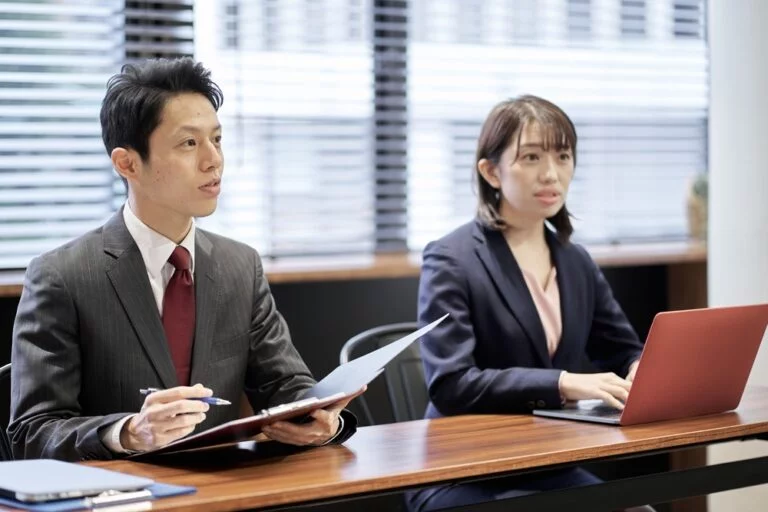Expert Tips for a Chinese Job Interview

If you’re reading this, there’s a good chance that you’re probably preparing for a Chinese job interview. Whether it’s your first interview or you’ve been through the process before, it’s always a good idea to brush up on your Chinese interview etiquette and understand the nuances of Chinese culture. So, let’s jump straight in!
Preparing for the interview
Preparation is key to acing any job interview, and a Chinese job interview is no different. Start by researching the company, its culture, and the specific position you’re applying for. Understand the job duty and how your career history aligns with it. If you’ve graduated recently, focus on your educational accomplishments and any new skills you’ve acquired.
Your Chinese language skills will be a significant asset. If Mandarin Chinese isn’t your first language, spend some time brushing up on your Chinese vocabulary and phrases. A good grasp of the Chinese language will not only help you understand the interview questions better but also impress your prospective employer.

Related Reading: Best Way to Learn Mandarin By Yourself: 15 Essential Tips
Greeting the interviewer
In China, the way you greet your interviewer is an essential part of the interview process, and it’s a facet that significantly differs from Western norms, highlighting the cultural differences between East and West. This greeting isn’t merely a casual hello; it’s a ritual steeped in respect and formality, a testament to the importance of first impressions in an interview in Chinese.
The standard greeting involves a firm handshake, a universally recognized gesture of professionalism and respect. However, in China, this handshake is often accompanied by a slight bow. This bow isn’t a deep one, like in some other Asian cultures, but a subtle nod of the head, a silent acknowledgment of the other person’s status and importance. It’s a small gesture, but one that carries a lot of weight, symbolizing your respect for Chinese customs and your willingness to adapt to them.

But the greeting doesn’t end there. In China, how you address the interviewer is just as important as the handshake and the bow. It’s crucial to address the interviewer by their official job title and surname. For instance, if you’re meeting with someone named Li Wei who holds the job title of Director, you would address them as Director Li, not just Li or Wei. This formality is a reflection of the hierarchical nature of the society in China, where one’s job title is a significant marker of their status.
Neglecting to use the correct job title is considered rude and can be seen as a sign of disrespect. It’s a faux pas that can easily be avoided with a little preparation and attentiveness. So, when you walk into that interview room, remember to greet your interviewer the Chinese way: with a firm handshake, a slight bow, and the correct address. It’s a small detail, but in an interview in China, it’s these small details that can set you apart.
Related Reading: How to Say “Nice To Meet You” In Chinese: 10 Phrases
Introducing yourself
When the interviewer asks, “请自我介绍” (Please introduce yourself), start with a brief overview of your personal background, educational history, and work history. If you’ve had relevant jobs, mention them. If you used to teach English, have been in similar job-related settings, or have experience working in Western companies, highlight these points. Remember, self-awareness is highly valued in China, so be honest and humble about your strengths and weaknesses.

Answering interview questions
When asked, “你是做什么工作的?” (What is your job?), or “你是什么专业的?” (What is your major?), respond with the following sentence structure: “我毕业于 [university name], 我的专业是 [major].” (I graduated from [university name], my major is [major]).
If the interviewer wants to know about your previous job, be prepared to discuss your job duties and how you’ve grown professionally. Remember that Chinese employers appreciate candidates who are willing to work overtime and can adapt to the working environment of Chinese companies.
Impressing the interviewer
To impress a Chinese interviewer, show respect for Chinese culture and demonstrate your language skills. If you can speak Mandarin, use it as much as possible during the interview. Even if Mandarin isn’t your first language, your efforts to speak Chinese will be appreciated.
Show your understanding of Chinese society by offering compliments about the company or the interviewer’s achievements. However, be careful not to overdo it, as it may come across as insincere.

Understanding the Chinese interview
A Chinese interview is not just a conversation. It’s a cultural exchange, a unique intersection where language, tradition, and professional aspirations meet. This interview opportunity is more than just a chance to land a job. It’s a platform to showcase your Mandarin Chinese skills, your understanding of China, and your ability to adapt to a Chinese company’s working environment.
In this formal setting, every word you speak, every gesture you make, and every response you give to an interview question is a testament to your preparation and eagerness for the role. If you can speak Mandarin, even if it’s not your native language, it’s an opportunity to demonstrate your linguistic capabilities. Speaking Mandarin during the interview not only helps you communicate more effectively, but it also shows your commitment to embracing the local culture, a quality highly valued by Chinese employers.
Understanding China goes beyond just knowing the language. It’s about appreciating the nuances of Chinese society, the values they hold dear, and the customs they follow. In a Chinese language job interview, your knowledge of these cultural aspects can make a significant difference. It can set you apart from other candidates who may have similar qualifications but lack the cultural understanding that you possess.

Adapting to a company’s working environment is another crucial aspect. Chinese companies often have a different work culture compared to Western companies. They value loyalty, respect for hierarchy, and a strong work ethic. Showing that you’re ready to embrace these values and grow professionally within this environment can give you an edge in the interview.
Finally, the way you present yourself, from your attire to your body language, plays a crucial role. In Chinese culture, respect is often conveyed non-verbally. That initial firm handshake, the respectful nod, maintaining eye contact, and using your interviewer’s surname — these are all signs of respect and professionalism.

Building relationships
In China, people place great importance on relationships, or “guānxi.” When potential business partners meet for the first time during a Chinese interview, they’re not just evaluating each other’s professional abilities; they’re also assessing whether they can build a trusting and mutually beneficial relationship. So, show genuine interest in the company and the people you meet. This will help you establish a good rapport with your potential business partners.

Your first interview in China
Your first interview in a Chinese company might feel different from what you’re used to in Western countries. The interview questions might focus more on your personal life, your family, and your hobbies. This is because Chinese employers want to understand you as a whole person, not just your professional skills. So, be prepared to share some personal stories and experiences.
Speaking Mandarin Chinese
Speaking Mandarin Chinese during a Chinese interview can give you an edge over other candidates. Even if you’re not fluent, showing that you’ve made an effort to learn the language will cast you in a favorable light. Practice some common Chinese phrases and use them during the interview. For example, you can say “我很高兴有这个机会” (I’m very happy to have this opportunity) or “我很期待能在贵公司工作” (I look forward to working in your esteemed company).

The importance of business cards
In China, exchanging business cards is an essential part of professional interaction. When you receive a business card, take a moment to read it and then keep it in a cardholder or your wallet. This shows respect for the person and their position. If you have a business card, offer it with both hands. This is a small detail, but it can make a big impression.
Understanding the culture of China
Understanding Chinese culture and societal norms is crucial for acing a Chinese language interview for a new job. Spend some time learning about Chinese history, traditions, and values. This will not only help you connect with Chinese people on a deeper level but also show your interviewer that you’re genuinely interested in becoming part of their community.
The application process
Like a Western interview, the application process for a job in a Chinese company typically involves submitting a cover letter and resume, followed by one or more interviews. The cover letter should, as always, be concise and tailored to the specific position you’re applying for. Highlight your skills and experiences that are most relevant to the job. During the interview, be prepared to answer questions about your cover letter and resume.
Remember, every interview is an opportunity to learn and grow. So, even if you don’t get the job, don’t be disheartened. Reflect on your experience, identify areas for improvement, and apply these lessons to your next interview. Good luck!
Wrapping up the interview
As the interview comes to a close, it’s important to leave a lasting impression. The final moments of your interview are just as crucial as the first. In China, just like in many other cultures, the way you conclude your interaction can significantly impact the interviewer’s perception of you.
Begin by shaking hands with the interviewer, a universal sign of respect and gratitude. However, remember that in China, a handshake is often accompanied by a slight bow. This combination of Western and Eastern customs reflects the global nature of the business world today and your adaptability to it.
Express your gratitude for the interview opportunity. A heartfelt thank you can go a long way in showing your appreciation. In Mandarin, you could say, “谢谢你给我这个机会” (Thank you for giving me this opportunity) or a similar closing remark. This simple phrase, spoken in the interviewer’s native language, demonstrates your effort to connect on a cultural level.
Next, express your interest in the next steps of the process. This shows your enthusiasm for the role and your eagerness to move forward. You could ask, “Could you please tell me about the next steps in the interview process?” or “When can I expect to hear about the interview results?” These questions show that you’re serious about the opportunity and are looking forward to the possibility of joining their team.

Remember to mention the company name in your closing remarks. This personalizes your statement and shows that you’re not just interested in any job, but specifically in a role at their company. You could say something like, “I’ve really enjoyed learning more about [Company Name] and am excited about the possibility of contributing to your team.”
Spending time on your closing remarks shows your attention to detail and your respect for the interviewer’s time. It’s a small gesture, but it can have a big impact. So, as you wrap up your interview, remember to shake hands, express your gratitude, ask about the next steps, and mention the company name before you say goodbye. These actions will help you conclude your interview on a high note, leaving a positive and lasting impression.
Related Reading: 12 Ways to Say You’re Welcome In Chinese
Post-interview etiquette
After the interview, it’s customary to send a thank-you note or email to the interviewer. This is a chance to reiterate your interest in the job and the company and to thank the interviewer for their time.
Good luck with the new job!
Remember, a Chinese job interview is not just about your skills and qualifications. It’s also about how well you understand and respect the culture of China. So, spend some time learning about China and its customs, and you’ll be well-prepared for your interview.
Good luck! You’ve got this!
Land your dream job in China — join our FREE webclass!
Are you ready to ace your job interview in China? Join our FREE webclass and learn how to speak fluent Chinese three times faster than a full-time student. Uncover the three secrets that make Mandarin fluency easy, fast, and above all, FUN! Register now and save your seat for this game-changing webclass!








